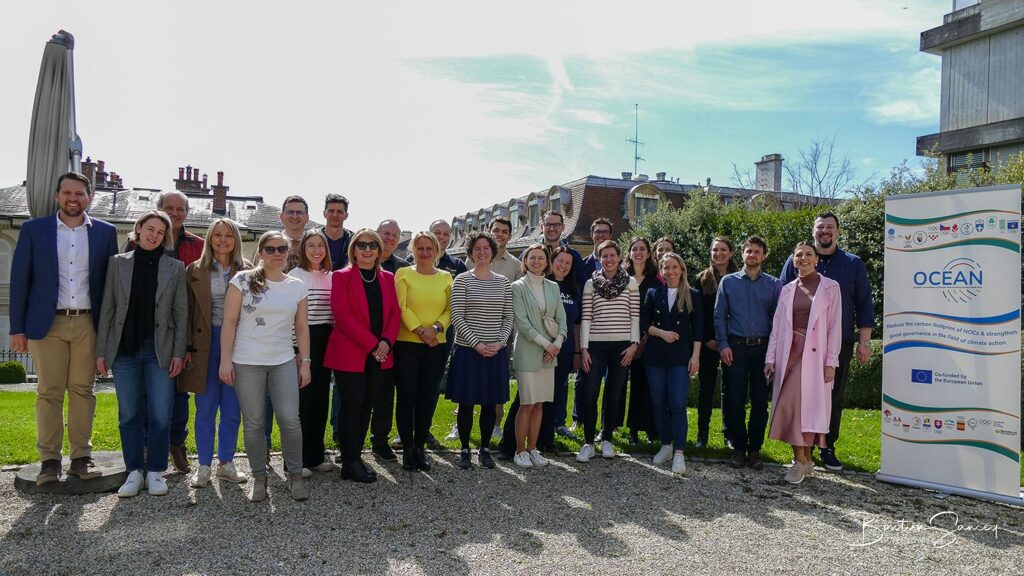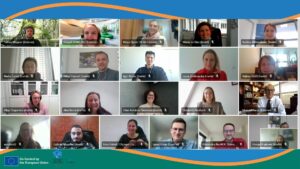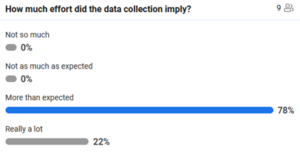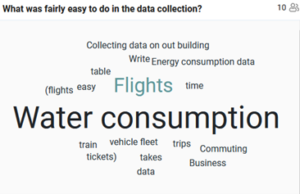The 18 Climate Action Officers engaged in the OCEAN Project started to develop their NOC’s carbon footprint reduction strategy, during a 3-day meeting in Lausanne.
From 18 to 21 March, the Climate Action Officers from the 18 partner National Olympic Committees (NOC) met in Lausanne to assess the progress made and acknowledge the first successes, one year after the launch of the OCEAN project (Olympic Committees of Europe Approaching Carbon Neutrality).
The 18 Climate Action Officers discovered their organisation's carbon footprint after working together with the Öko-Institut on the measurement over the last twelve months. It allowed them to understand their main sources of emissions and to engage in several discussion rounds with the Öko-Institut and Julie Duffus, from the IOC, on how NOCs can move forward in their transition and join the UN Sports for Climate Action Framework. After learning about the main steps of the carbon reduction process, the NOCs’ Climate Action Officers reflected on potential objectives to set and measures to take.
Jon Wyatt’s shared experience as Sports Director at the International Hockey Federation (FIH), managing his organisation's sustainability department gave the OCEAN Consortium valuable information to consider on how to manage the process of implementing a carbon reduction strategy. On this basis, Climate Action Officers were fully equipped to start drafting their carbon footprint reduction strategy.
The results of the NOCs’ carbon footprint measurement will be shared publicly in the course of this Spring, following which the Online Tool for carbon footprint measurement will be revealed to the public at the end of the year. In the meantime, Climate Action Officers are to finalise their NOC’s carbon footprint reduction strategy. The OCEAN Project will conclude in April 2025.

The third Consortium Call took place on January 23. The EOC EU Office organised this online conference to set up a feedback session on the various actions that have been implemented since the second Consortium Call in November and to give a summary of the tasks that would be coming up.
The Öko-Institut has presented the progress made in collecting data from each NOC. It should be submitted, reviewed and finalised before the next step of the OCEAN project, scheduled in Lausanne at the ANOC and IOC Headquarters from 18 to 21 March. Module 3 of the Training Course aims to enable NOCs to understand their carbon footprint, using the data analysis provided by the Öko-Institut and thereby start to elaborate a carbon reduction strategy.
In the meantime, Climate Action Officers will be asked to share some examples of good practices that they may have already implemented within their organisation.

On 12 December, the 3rd Online Seminar focusing on Carbon Footprint measurement occurred, led by OCEAN's scientific partner, Öko-Institut. The primary goal was to unveil the initial findings of the carbon footprint measurement, fostering a platform for Climate Action Officers to engage in discussions and share experiences related to gathering essential data within their NOC. Partner NOCs are in the final stages of data collection, while Öko-Institut is completing the reception process, poised to integrate the data for the comprehensive finalization of the measurement tool by the NOCs.
Following an overview of the data collection status provided by the Öko-Institut, partner NOCs were given the chance to exchange insights on their respective experiences with the data collection process. The consortium addressed key queries, including: 1) Assessing the level of effort involved in data collection; 2) Identifying aspects that were relatively straightforward during the process; 3) Highlighting challenges encountered in data collection; and 4) Proposing potential enhancements for the measurement tool.

Climate Action Officers stated to have provided more effort than expected on the data collection process due to the proportion and variety of data to collect. The consortium encountered obstacles regarding the calculation of the data, for which the use of online platforms was identified as a potential solution, especially regarding indicators for commuting. More importantly, Climate Action Officers were recommended to use estimates of travels and roughly compile reported numbers, rather than seeking the exact detailed data. To improve the measurement tool, partner NOCs will use a collaborative document for options for improvements regarding the data collection. The consortium was overall confident about future measurements (i.e. for 2024) as they are now equipped with adequate processes and tools to collect the necessary data within their NOC.

During the concluding part of the meeting, the Öko-Institut delivered an overview of the initial findings from the carbon footprint measurement, encompassing an overview of relevant terms within the context of carbon footprint assessment, along with a discussion on methodological choices and their implications. The conclusive results of this measurement are slated for presentation in March 2024, during Module 3 of the Training Course in Lausanne.
The final words of the meeting were dedicated to set the next steps of the project. The OCEAN consortium will convene virtually in January 2024, anticipating the forthcoming in-person meeting scheduled for March 2024 to kick off Module 3 of the Training Course for Climate Action Officers.

